Hybrid Conference
Sept. 28th to Oct. 1st, 2023
In-person at Hampton Inn & Suites, Boulder-North
6333 Lookout Road, Boulder, CO 80301
and via Zoom
For mental health and addiction professionals, organizational psychologists and leaders, policy makers, educators, and others who require a respectful understanding of persons. Topics to be presented at the 45th Annual Meeting are diverse and address a variety of clinical, social, and ethical issues using concepts from Descriptive Psychology (DP).

Cost for Attendance, including CE
$150 for non-members $125 for members $75 for students* (No CE)
* Student must be enrolled at least 1/2 time in a degree program to qualify for this rate.
In-person attendees are invited to the Banquet dinner on Saturday evening (cost not included in the conference fee. Folks who attend will pay for their own restaurant orders).
While we've offered the conference at no cost to attendees the past several years due to the pandemic, the planning committee opted for a break even approach this year. By making the conference affordable, our hope is to broaden the number and range of people who learn about and apply Descriptive Psychology in the future. The board will present a strategic plan in advance of the conference for discussion at the annual business meeting to consider the future direction of the Society. We hope to see as many members as possible attend in person, to help us celebrate the milestone of our 45th Annual Conference!
*** The registration site will be closed on 9/27 at 11:59 PM ***
Those who attend in person will receive this commemorative tote:
Accommodations
For those interested in attending in person and wishing to stay at the Hampton Inn Boulder-North, reduced rates for the conference are available until September 15th. Twenty rooms have been held until this date. The rates are: 2 Queen Beds Room - $199. This rate does not include tax and fees.
Hampton Inn Boulder-North Reservations:
https://www.hilton.com/en/attend-my-event/societyfordescriptivepsychology2023/
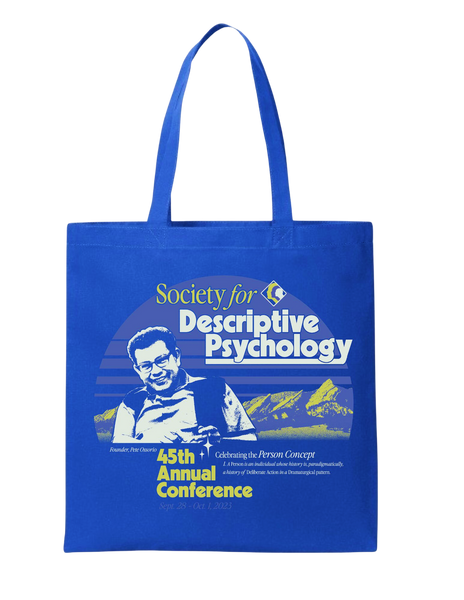

ABOUT THE SOCIETY
The Society for Descriptive Psychology, a non-profit organization registered in Colorado, is a Community exploring the Person Concept—an interdependent conceptual framework of Person, Behavior, Language, and World—to create common ground for the Human Sciences. The Annual Meeting of the Society is an opportunity to share advances in, and applications of Descriptive Psychology.
The primary goals of this conference are to continue the exploration of Descriptive Psychology as a conceptual approach to a broad range of topics within the behavioral sciences, social sciences, and humanities, to continue building the Descriptive Psychology Community, and to promote further discussion about new approaches to disseminating Descriptive Psychology concepts and applications. The conference will include introductory, intermediate, and advanced presentations.
Should you wish to express appreciation for the value of the information in the presentations or for the CE, please consider contributing directly to our student scholarship fund (offsetting expenses for students and emerging professionals to present at conferences), or by contributing to any non-profit organization serving mental health or community service initiatives.

Conference Schedule
THURS, SEPT 28th, EVENING SESSION
PLEASE NOTE: ALL PROGRAM TIMES ARE MOUNTAIN TIME ZONE!!!
6:15 PM – 6:30 PM
Conference Convenes
Welcoming Announcements
Introduction of the President by the President-Elect
6:30 PM – 8:00 PM
Presidential Address: Descriptive Psychology in Everyday Life (1.5 CE)
David Bender, Ph.D., Clinical Psychologist, Retired, Society President
Given that Descriptive Psychology provides access to all the facts and possible facts concerning persons and their behavior, ordinary daily living and the challenges people face, therefore, can be brought into the light of understanding. This presentation will make use of DP methodology, one heuristic, and a number of principles and slogans to demonstrate the utility of Descriptive Psychology in accomplishing an assortment of tasks in daily living. A new, yet an old, paradigm case of sexual behavior will be presented. Spiritual direction will be illuminated, and finally an approach to assisting the poor will be explained.
FRI, SEPT 29th
PLEASE NOTE: ALL TIMES LISTED ARE IN MOUNTAIN TIME ZONE!!!
9:00 AM – 10:00 AM
Therapeutic Approaches to Problems of Meaninglessness (1.0 CE)
Raymond Bergner, Ph.D., Professor, Illinois State University
In this presentation, I will describe therapeutic approaches to problems of meaninglessness that beset many clients. The presentation will include: (a) a conceptual formulation of meaningful action and, by extension, meaningful living; (b) a delineation of some common obstacles to meaning exhibited by clients; and (c) some therapeutic recommendations for addressing these obstacles.
10:00 AM – 10:10 AM BREAK
10:10 AM – 11:10 AM
Limiting Cases: The Nature of Persons (1.0 CE)
Mary K. Roberts, Ph.D., Clinical Psychologist and Independent Scholar
There are many different perspectives on the nature of persons, including the existentialists’ view that we have no pre-given essence. I will introduce a selection of these perspectives, as well as relevant resources from the Person Concept, and show how the different viewpoints are related. Clarity about the concept of human nature is valuable for therapists whose clients are dealing with identity and authenticity issues.
11:10 AM – 11:20 AM BREAK
11:20 AM – 12:20 AM
Navigating the Last Chapters of Life: Challenges and Opportunities (1.0 CE)
Laurie L. Bergner, Ph.D., Clinical Psychologist, Trainer and Consultant
The last chapters of life are a challenge! As people get into their 70s, they are faced with the reality of the finality of their lives, and the limits of life feels like it is fast approaching. How do people adjust to this reality and to the profound changes in their lives that this reality brings up? One could say that our world changes, and this changes us. How does our world change, and how do we deal with these changes? Old age involves many losses, so how do people navigate the changes needed to adjust to these losses? Are there possible gains to offset the losses? This presentation will look at the last chapters of people’s lives and how people navigate, or attempt to navigate, this challenging time of life.
12:20 AM – 1:00 PM
Perspectives from Older Therapists: How Have We Changed Therapy as We've Aged? (No CE)
Laurie L. Bergner, Ph.D., Panel Facilitator
Many of us are "seasoned" or "mature" therapists - meaning we're getting older and have been doing therapy for many years. It's interesting to reflect on how we have changed over our lives as therapists. How has our life experience influenced how we do therapy? Are there things we tell our clients today that would have been different if we saw them 30, 40, 50??? years ago? Are there things like boundaries that have changed for us, and if so, in what ways and why? Would we, as older people, seek out a younger therapist if we were seeking therapy now? If not, why not? If so, why?
In this discussion, several "seasoned" therapists will reflect on these questions and give their perspectives, and then we will open the discussion to others in the audience.
SAT, SEPT 30th
PLEASE NOTE: ALL TIMES LISTED ARE IN MOUNTAIN TIME ZONE!!!
9:00 AM – 10:00 AM
The Alien and the Earthling: Status Dynamic Role Play Therapy with Children (1.0 CE)
Charlie Kantor, Ph.D., Clinical Psychologist, Retired
At the 2008 Conference of the Society for Descriptive Psychology, I presented a Descriptive Psychology formulation of the significance of play in the development of children.The presentation was subsequently published as Children’s Imaginative Play in volume IX of Advances in Descriptive Psychology (2010). Therapeutic role playing with children was briefly described near the end of this article. I wrote: “A more formalized version of the use of imaginative play to help children reassign statuses and reconstruct their worlds is play therapy with children and more specifically role playing therapy with children. Role playing involves setting up scenarios within the play therapy setting and having these scenarios be versions of what the child is struggling with outside the play room. By trying on different statuses and acting as a self assigner of these statuses, a child in play therapy can experience increased behavior potential and then take that ‘act’ on the road, into Our world.” This presentation will be a more in depth exploration of this role playing approach. By virtue of a case study, the variety of ways to introduce and set up a role play and the status dynamic approaches the therapist employs to enhance the behavior potential of young clients will be illustrated.
10:00 AM – 10:10 AM BREAK
10:10 AM – 11:10 AM
Preparation for Descriptive Psychology: Conversations with Ossorio on Reading Wittgenstein (1.0 CE)
Wynn Schwartz, Ph.D., Lecturer, Harvard Medical School
In an early meeting with Ossorio, I asked what might assist my understanding Descriptive Psychology. He suggested Wittgenstein. During Wittgenstein’s life, he published one book, the 1921 Tractatus Logico-Philosophicus, dying before the 1953 publication of his second, the Philosophical Investigations. The Tractatus starts with “The world is all that is the case.” The Tractatus asserts “The world is the totality of acts, not of things,” and “What is the case—a fact—is the existence of states of affairs.” In my reading, a prime mission of the Investigations was amending and expanding the concept of World. So, I read, and we discussed what was at stake for Wittgenstein as he assembled a methodology of reminders and maxims in the service of describing the fully connected but irregular terrain of language and world; that “there is not a single philosophical method, though there are indeed methods, different therapies, as it were.” This reading and discussing prepared my encounter with The Person Concept. Some of this I’d like to share.
11:10 AM – 11:20 AM BREAK
11:20 AM – 12:20 PM
Making “What Actually Happens” Accessible (1.0 CE)
H. Joel Jeffrey, Ph.D., Professor Emeritus, Northern Illinois University
Ossorio’s formulation of the real world is unique: the first, and only, precise, systematic articulation of the concept of the real world. It is also the least understood of the foundational formulations of Descriptive Psychology. The goal of this presentation is to make that articulation accessible to Descriptive Psychologists and anyone interested in the profound relationship between persons and worlds. That relationship underlies the necessity of multiculturalism, the multiple worlds of organizations, consciousness, and the profound difficulty of communication between truly different cultures. Further, it highlights areas of inquiry virtually unexamined by Descriptive Psychologists, including the body, art, and music.
SAT, SEPT 30th EVENING
PLEASE NOTE: ALL TIMES LISTED ARE IN MOUNTAIN TIME ZONE!!!
5:00 PM – 6:00 PM Business meeting (In-Person and Virtual for Members Only)
6:00 PM – 6:30 PM Society Social Time for both Virtual and In-Person attendees,
Announcements and Celebration - All are Welcome!
6:30 PM Continuation of Social Time for Virtual attendees with a Virtual Host
6:30 PM Happy Hour in Hotel Lobby for In-person attendees
7:30 PM Banquet dinner offsite at a nearby restaurant for In-person attendees
Address: Appertivo 5530 Spine Road, Boulder, CO 80301
Map:
SUN, OCT 1st
PLEASE NOTE: ALL TIMES LISTED ARE IN MOUNTAIN TIME ZONE!!!
9:00 AM – 10:00 AM
What’s Going on Between Clarence Thomas and Humiliation: An Analysis of Opinions, Actions, and Personal History, with the Assistance of the Four Ingredient Model of Humiliation (1.0 CE)
Walter Torres, Ph.D., Clinical Psychologist
Utilizing Torres and Bergner’s four-ingredient model of humiliation, biographical information, and analyses presented in Supreme Court opinions, the relationship between Clarence Thomas and humiliation is analyzed; psychological bases for its development are postulated.
10:00 AM – 10:10 AM BREAK
10:10 AM – 11:10 AM
Parametric Analysis of Human Sexuality and Its Application in Clinical Assessment and Interventions (1.0 CE)
Michael Scott Fiorini, Psy.D., Post-Doctoral Fellow, Bryant West Psychology, New York, NY
This presentation is a discussion of a parametric analysis of human sexuality. The analysis can be used to understand sexual identity or sexuality experiences. Additional discussion of its development and potential use-case in assessment will be a component. The presentation will include slides discussing the parameters, why and how it was used to describe demisexuality, other identity applications, visualizations, prospective assessment formats, and a discussion session for attendee feedback and contribution. As a nascent research area, a brief overview of existing ethical clinical practices for treatment of sexuality and LGBTQIA clients will be discussed.
11:10 AM – 11:20 AM BREAK
11:20 AM – 12:20 PM
What Does It Mean to be Mistaken About Behavior Potential? (1.0 CE)
Ian Newby-Clark, Ph.D., Chair, Department of Psychology, University of Guelph
Grace Colp, B.A., (Honours), Psychology, University of Guelph, 2023
In this talk, we explore the powerful, complex, and fascinating concept ‘behavior potential.’ We first consider aspects of behavior potential—including the idea of a person's behavioral possibilities, the correlative of Reality (reality constraints), and a person's status. We then introduce the usefulness of considering the 'thinness' and 'thickness' of behavioral possibilities. Next, we explicate the utility of tautologies in science—a foreign idea to many—before going on to illustrate the utility of the behavior potential tautology, "a person will always choose more behavior potential over less behavior potential." We then consider what it might mean to say that someone is mistaken about his/her or another’s behavior potential. In particular, we discuss the difference between 'known unknowns' and 'unknown unknowns.' In that context, we explore the different kinds of mistakes about behavior potential that actors, observers, and critics could or do make. Along the way, we tie in relevant findings from work in social psychology, and judgement and decision-making, including the problem of bystander intervention, the Sunk Costs Fallacy, and the Planning Fallacy.
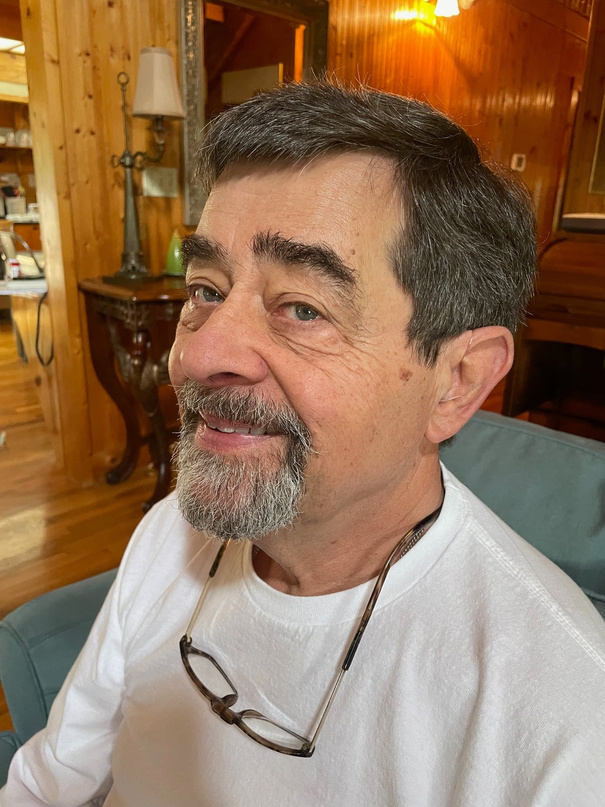
Presenter Bios
David Bender, Ph.D., Clinical Psychologist, Retired, Society for Descriptive Psychology President,
David Bender is a native of Indiana. He traveled north to Purdue for his bachelor’s degree in psychology; went west to California State College at San Jose for his masters and then to the southeast, Tennessee, for his doctorate. He has worked as a staff psychologist and ward director in a traditional psychiatric hospital, as a treatment provider in a regional mental health clinic, a general medical hospital, skilled nursing facility and in a private practice setting. His work has involved treating children, families, and adults, in inpatient and outpatient settings including individual, conjoint and group therapy settings. He has provided psychological evaluations for forensic efforts, fitness for duty and treatment planning. His most rewarding work involved supervision of students and time spent providing service to various community organizations. He has been married for 45 years, has two children and four grandchildren. He is a past president of the Society for Descriptive Psychology, past president of a Rotary International Club and past grand knight of the Knights of Columbus. He has been known to garden, fish and backpack.
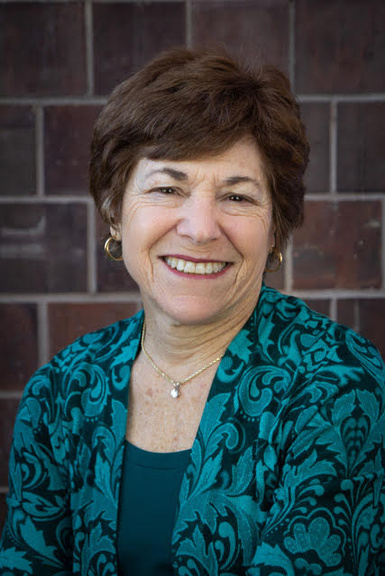
Laurie Bergner, Ph.D.
Laurie Bergner is a clinical psychologist with a Ph.D. from the University of Colorado and a B.A. from the University of Rochester. She has a private practice in Bloomington, IL, with special focus on marital and family therapy. In her many years of practice, Dr. Bergner has consulted with organizations, including police departments. Her expertise extends to community workshops, including topics like conflict resolution and self-esteem. She has served on the boards of organizations focusing especially on the nonpartisan League of Women Voters and the Immigration Project. As an independent scholar, she has presented at conferences on marital therapy, male-female relationships, and more.
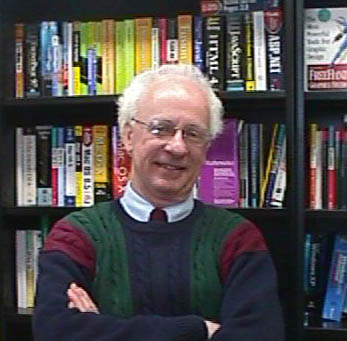
Raymond M. Bergner, Ph.D.,
Raymond Bergner received his Ph.D. in Clinical Psychology from the University of Colorado under the direction of Peter Ossorio. He is currently Full Professor of Psychology at Illinois State University and has a private practice in Bloomington, Illinois. His work in Descriptive Psychology has been concerned with its applications to psychopathology, psychotherapy, and various philosophy of science issues. He is a two-time President of the Society for Descriptive Psychology (1984 and 2004), a member of the Editorial Board of Advances in Descriptive Psychology since its inception, and the co-editor of four volumes in this series. Dr. Bergner has published over 65 articles, book chapters, books, and edited books. Many of these articles have appeared in such national and international journals as Family Process, Psychotherapy, the American Journal of Psychotherapy, The Journal of Sex and Marital Therapy, and Clinical Psychology: Science and Practice.
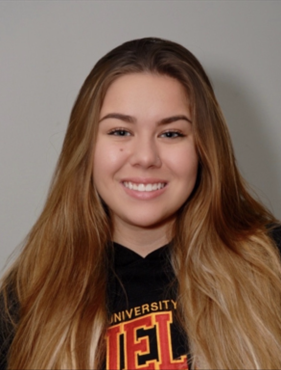
Grace C. Colp, B.A.,
Grace Colp received her BA Honors (with Distinction) in Psychology from the University of Guelph in 2023. Her current work is focused on theoretical psychology, with Descriptive Psychology a particular point of emphasis. Grace plans to attend graduate school in Psychology. In her spare time, Grace enjoys being in the Great Outdoors, hiking and kayaking.
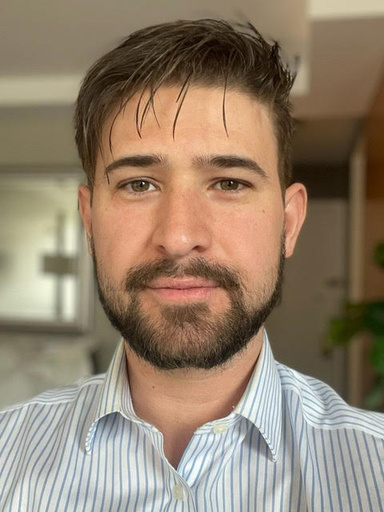
Michael Fiorini, Psy.D., Clinical Psychology Post Doctoral Fellow4
Michael Fiorini has over 9 years of experience working with children, teens, and adults of all ages in individual, family, couples, and group psychotherapy. Clients see him for a wide range of issues. He has worked with challenges regarding identity development, relationships, trauma, depression/anxiety, addictions, suicidality, self-harm, anger management, compulsive behaviors, autism, and ADHD among many other things. He has also worked extensively in supporting the LGBTQIA+ community, BIPOC, and those dealing with systemic inequities and challenges. His perspective is mostly behavioral, relational, and humanistic. His therapeutic specialty is Acceptance and Commitment Therapy (ACT) with mindfulness and meditative practice also a major focus.
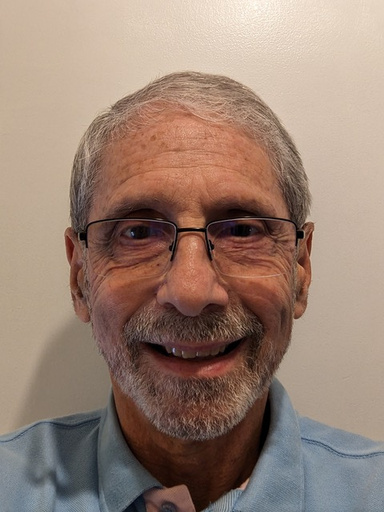
H. Joel Jeffrey, Ph.D., Professor Emeritus, Northern Illinois University
Joe received his B.S. in Mathematics from Caltech in 1969, and went to the University of Colorado to study Computer Science. For the next 5 years, he divided his time between Computer Science and Clinical Psychology. Most of his work in psychology was in Descriptive Psychology, under Peter Ossorio. After finishing his Ph.D. in Computer Science, he was an Assistant Professor at Vanderbilt University for three years. He then moved to Bell Laboratories, where he used Ossorio’s Basic Process Unit formalism to build the first frame-based expert system, one of the first two industrial expert systems. He then moved to Northern Illinois University, where he was an Associate and then Professor of Computer Science. At NIU, his research was focused on fields at the intersection of computer science and psychology, including artificial intelligence, software engineering, and behavioral economics. In 1999 he developed and patented an extension of Ossorio’s subject matter relevance technology, and founded a company, H5 Technologies, based on it. These days his professional interests are in physics and using Descriptive Psychology to formulate issues related to worlds and consciousness, including ultimate consciousness.
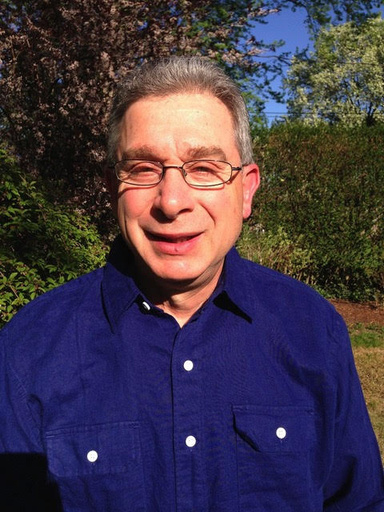
Charles Kantor, Ph.D.
Charles Kantor received his Ph.D., under the direction of Peter G. Ossorio, in clinical psychology from the University of Colorado, Boulder in 1977. Trained as a child clinical psychologist, he practiced as a play and family therapist at the Rochester Mental Health Center for 16 years before beginning a full time private practice. He has led workshops on role playing with children and on a variety of issues dealing with parenting adolescents and treating troubled adolescents. He has also consulted with counselors, therapists, teachers, administrators and others involved in day care centers for children, day treatment centers for adolescents, and outpatient centers treating children and adolescents. In recent years he has presented various topics at the conference of the Society for Descriptive Psychology including imaginative play, parenting, charismatic leaders, genocide, and tribalism. He is retired and lives with Nancy in Rochester, NY.
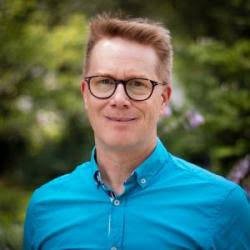
Ian Newby-Clark, Ph.D.
Ian Newby-Clark is Professor and Chair in the Department of Psychology at the University of Guelph and Past President of the Society. He received his BSc from the University of Toronto in 1993 and his PhD from the University of Waterloo in 1999, with a focus on social psychology and methods and statistics. Ian’s research now focuses on flow of consciousness (especially daydreaming) and how Descriptive Psychology can inform and facilitate its study. Ian also continues to explore the power of DP concepts and conceptual tools. For challenge and recreation, Ian enjoys skiing and continuing his journey of becoming a licensed glider pilot.
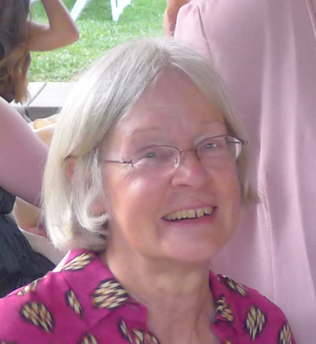
Mary K. Roberts, Ph.D.
Mary K. Roberts is a writer in Boulder, Colorado. She received her Ph.D. in clinical psychology from the University of Colorado, Boulder in 1980 and practiced as a psychologist for nine years. She then earned her M.S. in computer science from the University of Colorado and worked as a software engineer for eight years. She has served as President of the Society for Descriptive Psychology and as a member of the Editorial Board for Advances in Descriptive Psychology. She also created the Society's first web site and served as the first Webmaster. Her recent work in Descriptive Psychology focuses on understanding a range of world reconstructive phenomena, including dreams, imaginary companions, and worlds of uncertain status.
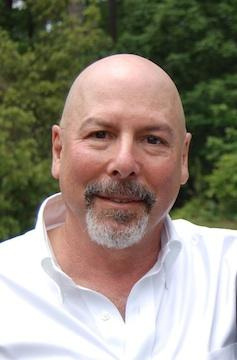
Wynn Schwartz, Ph. D.,
Wynn Schwartz is a clinical and experimental psychologist and research psychoanalyst. He is a professor of psychology at the Massachusetts School of Professional Psychology and on the faculty of Harvard Medical School and the Harvard Extension School. He has been a professor at Wellesley College and has taught at the Boston Psychoanalytic Society and Institute and the Massachusetts Institute of Psychoanalysis. He maintains a psychotherapy practice in Boston. Dr. Schwartz has been interested in clarifying fundamental aspects of the subject matters of psychotherapy, psychoanalysis, dreaming and hypnosis. His published work has been both conceptual and experimental. Some of his experimental studies have focused on dreaming and problem representation and dreaming and memory, and others on hypnosis and episodic memory. As a student of Descriptive Psychology, Dr. Schwartz has been especially concerned with theory-free, pre- empirical formulations of what he believes are central subject matters for psychology, such as the concepts of action and responsibility, the range of the possible phenomena that are covered by the term "hypnosis", the limits and nature of psychotherapy, and the concept of "person".
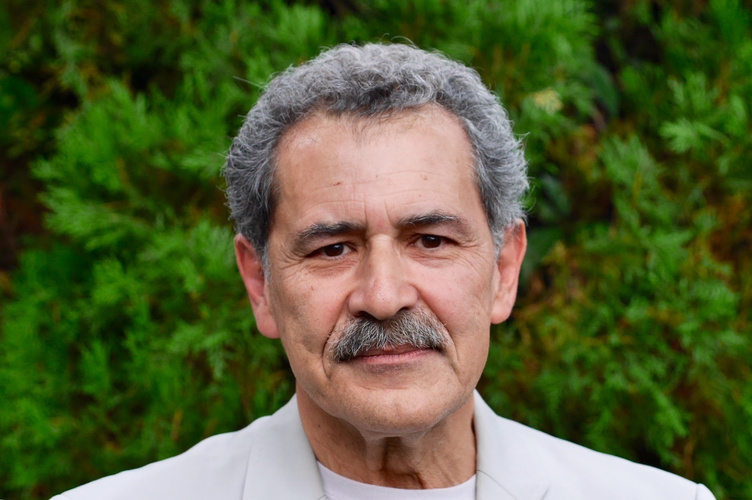
Walter J. Torres, Ph.D.
Walter J. Torres is a clinical and forensic psychologist practicing in Denver, Colorado. His first contact with Descriptive Psychology dates to 1972, when he took a Personality course from Peter Ossorio at the University of Colorado in Boulder. Since then, Descriptive Psychology has been the keystone to his conceptual and practical orientation in both the clinical and forensic domains. He is a past President of the Society for Descriptive Psychology. His recent Descriptive formulations and presentations include trauma and its treatment, and the nature, consequences and alleviation of humiliation.


Continuing Education Information: This program includes up to 10.5 CE for both in-person conference attendees and for persons attending the conference virtually. The University of Denver, Graduate School of Professional Psychology (GSPP) is approved by the American Psychological Association to sponsor continuing education for psychologists. GSPP maintains responsibility for this program and its content.
Conflict of Interest Disclosure: The Society for Descriptive Psychology is a not-for-profit volunteer organization. The Society and all speakers at this conference specifically have no other personal, business, or volunteer affiliations that may give rise to a real or apparent conflict of interest, relative to the content of presentations. In addition to assuring the conflict free status of speakers, the purpose of this statement is also to protect the Organization's tax-exempt status when contemplating a transaction or arrangement that could benefit an officer, director, or employee. This policy is intended to supplement but not replace any applicable state and federal laws governing conflict of interest that apply to non-profit organizations.
If you have questions about any aspects of the Conference, please contact the Conference Planning Coordinator, Craig Webster, at chwebster@gmail.com.
